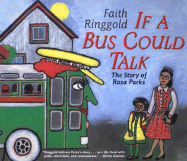If a Bus Could Talk: The Story of Rosa Parks

 |
 |
 |
|---|---|---|
     |
Sensitivity |      |
     |
Judgment |      |
     |
Focus |      |
     |
Action |      |
by Faith Ringgold
If a Bus Could Talk: The Story of Rosa Parks is about self-enhancement, prudence, morality, and a series of events. The genre of the story is Drama, the setting is Contemporary, and the heritage is North American.
A biography of Rosa Parks from the time she was a small girl that emphasizes the unjust treatment of African Americans in the 1950's and before which explains the importance of her actions
The theme of the story is Your actions as an individual can effect a positive change for many.
 |
Violence Violence in the story is not graphic, and rewarded sometimes. Harm to other living things happens and focuses on outside family or group. |
 |
Cruelty |
 |
Rudeness The story is mostly rude. |
 |
Religion/Spirituality The religion/spirituality in the story is judeo-christian and respect for the religion is shown . |
 |
Stereotypes There is stereotyped culture/race/ethnicity/nationality in the story. |
Key Virtues
- Courage
- Fairness/Justice
- Persistence
- Citizenship
- Self sacrifice
- Altruism/Unselfish care for others
- Hope
- Self confidence
- Social Responsibility
- Strength
Key Vices
- Injustice
- Cruelty
- Hatred
- Unkind
- Anger
- Arrogance
- Contempt
- Disobedience
- Excludes others
- Foolishness
The 4 Component Model
- Ethical Sensitivity - Evidence of concern for others and awareness of the consequences of one's actions.
- Ethical Judgment - Shows characters deliberating about ethical choices.
- Ethical Focus - Addresses the ethical demand in the situation, prioritizing moral goals and responsibilities over selfish interests.
- Ethical Action - Has a character who takes several steps to reach a moral goal and perseveres to complete the ethical action.